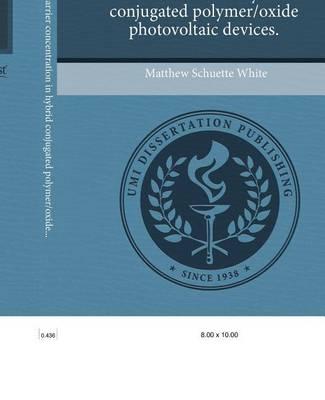Overview
Organic photovoltaics (OPV) represent an attractive route towards inexpensive, lightweight, and abundant renewable energy. The principal criticisms of OPV are low power conversion efficiency and unstable materials resulting in short device lifetimes. Hybrid OPV (h-OPV) devices with ZnO functioning either as the electron acceptor in the heterojunction, or as an electron transport layer in a polymer/fullerene based heterojunction, present useful device structures for investigating the functional mechanisms within OPV devices and a possible pathway towards air-stable high efficiency devices. Such use allows the vast knowledge surrounding oxide nanostructure morphology, band position, and carrier concentration control to be used in designing bulk-heterojunction OPV devices. The work presented in this thesis explores the effects of carrier concentration modulation in the polymer and/or oxide layers of these devices. Exposure to air is known to induce chemical defects in polymer semiconductors, which act as dopants in OPV devices. This increase in doping density can be used to improve OPV devices, however the low work-function metallic electrodes are often highly air sensitive. Using a silver back electrode and a ZnO interlayer at the transparent front contact in a polymer-based bulk heterojunction device allows for fabrication and testing in air. Relatively efficient devices are fabricated in this manner, but the devices show a characteristic aging time that indicates that air is a requirement to function as a quality diode. Air exposure may be effecting any of the layers in the device, but evidence is presented that shows the increased doping density in the polymer is largely responsible for the change in device quality over this time period. When oxides are used as the electron acceptor material in the device heterojunction, the carrier concentration in both the oxide and the polymer determine the strength of the electric field at the junction. Oxygen related doping of the polymer is a requisite for functional devices, but intentional doping of the oxide provides an additional degree of control over interfacial electric fields. By using planar hybrid heterojunctions, the utility of this effect is shown by increasing the driving force for charge separation. Interfacial barrier layers are required on highly doped ZnO to prevent recombination and preserve high fill factors. The measurable carrier concentration in the depletion region of polymer and polymer-fullerene blend films is shown to be significantly larger under illumination than in the dark. This effect is not related to breaking of the conjugated bonds in the polymer, as is the device aging phenomenon, but stems from low mobility of photo-generated electrons. The depletion width and maximum electric field in devices are influenced by the presence of an increased effective doping density under illumination.
Full Product Details
Author: Matthew Schuette White
Publisher: Proquest, Umi Dissertation Publishing
Imprint: Proquest, Umi Dissertation Publishing
Dimensions:
Width: 20.30cm
, Height: 1.10cm
, Length: 25.40cm
Weight: 0.345kg
ISBN: 9781243631282
ISBN 10: 1243631287
Pages: 168
Publication Date: 01 September 2011
Audience:
General/trade
,
General
Format: Paperback
Publisher's Status: Active
Availability: Temporarily unavailable

The supplier advises that this item is temporarily unavailable. It will be ordered for you and placed on backorder. Once it does come back in stock, we will ship it out to you.




